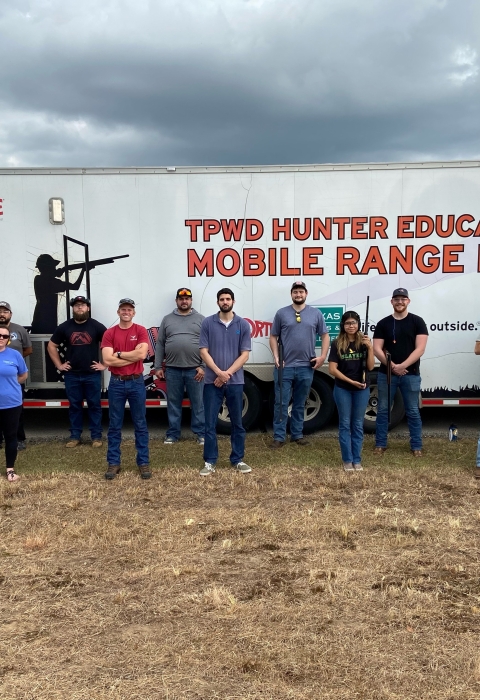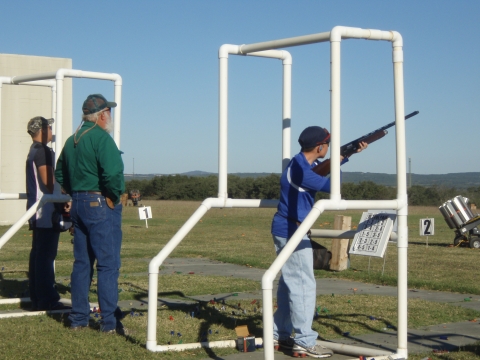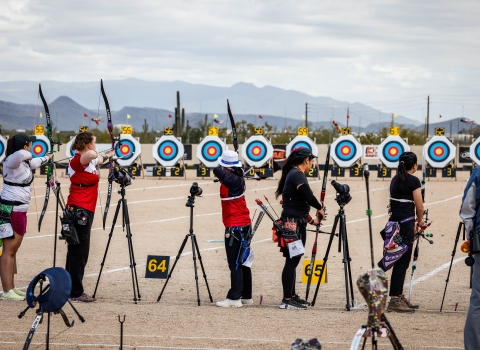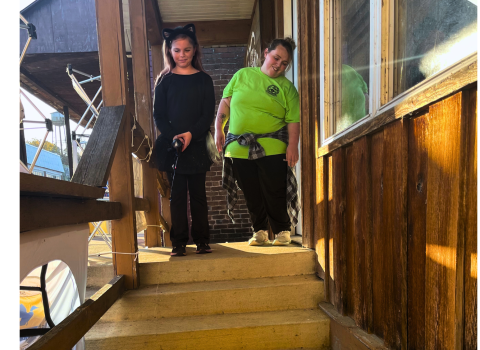This summer America’s best marksmen and markswomen are setting their sights on gold. The U.S. shooting team consists of shotgun, rifle, and pistol Olympians who have spent years training to reach this elite level of competition. Like other shooting sport enthusiasts, many current and past Olympians got their start in target shooting in programs like 4-H shooting sports. Around the Nation many of these youth programs partner with state fish and wildlife agencies to use funds from manufacturer excise tax through the Pittman Robertson Act to introduce participants to outdoor pursuits. In Texas, this excise tax has supported a partnership with 4-H that creates a safe and supportive environment that teaches hunter education and shooting sports to thousands of youth each year.
4-H is the largest youth development program in Texas, reaching more than 550,000 kids and teens each year. Started in 1908, Texas 4-H is part of Texas A&M AgriLife Extension Service and the Texas A&M University System. In 1994, recognizing the potential for partnership, Texas Parks and Wildlife Hunter Education Coordinator Steve Hall began working with Dr. Don Steinbach to expand access to hunter education and the shooting sports. Steinbach supervised 4-H specialists and had direct access to Texas Agriculture Extension Agents in all 254 Texas counties.
Using a portion of the excise tax funds appropriated to Texas Parks and Wildlife through the U.S. Fish and Wildlife Service’s Office of Conservation Investment, Hall began a partnership to hire dedicated staff to specifically support 4-H shooting sports chapters and programs. Another partnership initiated by Hall connected the state agency with the National Skeet Shooting Association to provide funding for a mobile sporting clay trailer that travels the state to engage young shotgun shooters including those in 4-H programs. “By partnering with local county agriculture extension agents and 4-H, and target shooting conservation organizations, these funds support the next generation of hunters and shooting sport participants teaching firearm safety, shooting techniques, and builds a community of 10,000 youth a year,” said Hall. “For a select number of 4-H shooting sport youth, these programs also plant the seeds for future Olympians.”
One of the best trap shooters in the country, Ryann Phillips has earned a ticket to Paris as one of eight U.S. shotgun athletes in the 2024 Olympics. Phillips, a Texas native, started shooting in 4-H while in third grade. Phillips initially wanted to show animals, but after her mom said no, Phillips chose to participate in shooting sports. While in 4-H she learned both shotgun shooting and archery and stuck with shotgun competing in many different 4-H shooting competitions. She worked her way to the Texas State Junior Olympics and Nationals before earning a place on her first USA Olympic team. Fellow first-time Olympian Katelyn Abeln got into shooting sports through her local Georgia 4-H where she started shooting BB guns and learned about firearm safety. Abeln will be representing the U.S. in women's air and sport pistol.
Olympic veteran Vince Hancock also has 4-H ties. Known as In“Vince”able to some in the shooting sports, Hancock began shooting at the age of 10 with his father who was the local 4-H coach. Now in his fourth Olympics, Hancock hopes to add another men’s skeet gold medal to his collection of gold medals from the 2020 Tokyo Olympic Games, 2012 London Olympic Games, and 2008 Beijing Olympic Games. Hancock’s 2020 Tokyo Olympic teammate James Hall also got his start in 4-H. Hall and his younger brothers joined Georgia 4-H shooting sports with their mom eventually becoming a team coach.
“The agriculture extension network and 4-H chapters welcome kids that might not necessarily know they want to do shooting sports, but they give it a try and the rest is history,” adds Hall. “Some go on to become champions, and they thought they would never handle a firearm.” In Texas, 4-H uses hunter education as the basis for their shooting sports, teaching firearm and archery safety and responsibility to everyone who joins shooting sports chapters throughout the state.
Those wanting to test their hunter education and target shooting skills and those wanting to experience a shooting sport competition, can utilize the mobile sporting clays trailer that travels the state to engage young shotgun shooters. Since 1995 a full-time staff range coordinator, whose salary is paid from the excise tax fund, has managed the trailer through a partnership with the National Skeet Shooting Association. The mobile range hosts 40-50 target events annually, most for 4-H participants, Ag Science Education high school students, and new shooters. This past year, the trailer reached over 19,000 participants through the hard work of Texas Parks and Wildlife Hunter Education staff member, Morgan Harbison, who also grew up through the 4-H system and who won many awards for shooting sports.
One of the most anticipated mobile range events coordinated by Harbison is the 4-H “Whiz Bang”. Whiz Bang events feature 5-STAND sporting clays that tests a youngster’s skill in shooting clay targets from 6 to 8 machines. Much like hunting scenarios, participants shoot at simulated doves, quail, pheasants, waterfowl, and rabbits. Following these events some of the participating 4-H youth may qualify to shoot at the state finals. “Shooting sport programs build a routine just like when kids join a soccer team with regular practices,” said Hall. “This access, routine, and path to competitions is where they develop the skills and passion to take their skills to the next level, we call these the 1 percenters.” Hall knows that only a handful of Texas youth will compete nationally and maybe reach the Olympic games. However, the seeds that Texas Parks and Wildlife and their 4-H partners plant provide the state’s youth with hunter education, safe shooting sports access, and builds a variety of life skills like patience, perseverance, and passion that are needed for success for both Olympians and everyday folks.
Other states use excise tax funds in the same manner Texas Parks and Wildlife does to promote safe and enjoyable youth programs. To learn more about 4-H shooting sports in your area or the 4-H National Shooting Sports Championships held each year in Grand Isle, Nebraska visit https://4h.unl.edu/shooting-sports/national.





